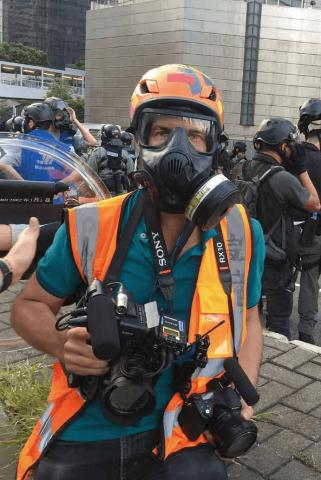Issue:
Randy Schmidt

CBS
By Julian Ryall
“YOU GET TO DO SO MANY THINGS THAT MOST PEOPLE DON’T GET TO DO”
Randy Schmidt is a difficult man to pin down. One day he’s in Hong Kong, filming confrontations between protesters venting their fury at the city’s government and riot police who have, in recent days, shown an alarming propensity to use live rounds at very short range and the next he’s off to India for another assignment. After that, he might be back home in Tokyo for a few days. But it’s very possible that something else is going to crop up somewhere else in the Far East and he will be living out of his backpack once more.
It’s a punishing schedule that is particularly hard on his wife and 9 year old son Dylan, but he still gets that familiar kick out of what he does. “I love it because there is so much variety, and you get to do so many things that most people don’t get to do,” he said. Originally from Saratoga in California, the 56 year old Schmidt is now both cameraman and editor contributing to all CBS news programs from the region. “I like the thrill of breaking news assignments on location somewhere and doing lots of live shots, and I like taking my time and shooting and editing feature stories.”
Covering the news is not, however, the career that Schmidt intended after finishing a degree in motion pictures and television at UCLA. “My initial interests were in Hollywood motion pictures, as a cinematographer, director or screen writer,” he said, and his first position was as an artist and animator on a stop motion animated short titled, Frog and Toad are Friends.
“I worked at 20th Century Fox for the producer of Die Hard and other action movies, but I was mainly performing screenplay analysis, which was too much of a desk job for my liking,” Schmidt said. “I also worked for a small production company in Los Angeles which did TV news coverage within the United States for Japan’s Fuji TV network.” The company was run by a Japanese woman who was effectively the Fuji TV news correspondent. Schmidt’s coverage included the infamous Kazuyoshi Miura murder case in the mid 1980s, in which a Japanese businessman allegedly had his wife murdered in order to collect insurance money.
Schmidt’s work for Fuji TV gave him an opportunity to visit Japan for two weeks in 1986, followed by similar spells in 1987 and 1992 and that helped piqued a boyhood interest in the country that he traces back to the 1967 James Bond movie You Only Live Twice.
“Even then,” he said, “I never really thought about moving. But in 1996, dissatisfied with my career not really taking off in Hollywood, I thought I would have an adventure for a year and move to Japan.” Making that leap in pre Internet times was far more tricky than it is today, and Schmidt found it difficult to find information on living and working in Japan. He had no job lined up and was in the catch 22 position of not being able to get a job without a working visa and not being able to get a working visa without a job.
“But then I got lucky,” he said. “I started to get freelance work with CNBC as a cameraman editor and five months after arriving, I landed a staff camerman editor job at the Tokyo bureau of CNN.” Schmidt stayed with CNN until massive editorial cuts in late 1997 reduced the Tokyo bureau from 13 positions to just 5. After five years, including a stint with Reuters and lots of freelancing, he set up his own production company, American Ronin Productions, that worked with all the major English speaking networks.
In February, 2006 on the strength of shooting an interview with Madonna for CBS Schmidt was hired to work at the broadcaster’s Tokyo bureau, covering all of Asia, including China for up to six months of the year and North Korea. “I travel as much as seven months of the year,” he said. Until two months ago he even maintained a China Resident Journalist Visa, which requires journalists to physically be in mainland China for 183 days of the year.
Technology has made Schmidt’s life significantly easier. His equipment is far lighter and more compact, SD video has changed to HD, and multiple hard cases of editing decks and monitors have been whittled down to a single laptop. It also helps with personal relationships. “I was 43 when I took the CBS News job and started travelling extensively,” he said. “It’s tough, especially on my young son, but we chat once or twice a day via Skype and play chess remotely online. An hour ago, he kicked my ass.”
North Korea remains Schmidt’s “most fascinating” assignment. He has been to Pyongyang on eight occasions and once to Wonsan, when the North Korean regime invited the Western media to record the destruction of tunnels at its nuclear test site.
Another favorite is India, where in 2013 he covered the Kumbh Mela festival, with 40 million people descending upon a village for a religious event that is believed to have been the largest gathering of people in history.
Documenting the impact of the Tohoku disaster in March 2011 was especially tough work. “It was simply shocking to see how much damage was caused by the tsunami,” he said. “All the lives lost, towns wiped out. Ships littered all over the place. “There is a cliché that cameramen are somewhat immune to the horror of what might be happening in front of them because you are working and sort of ‘watching TV’ in your viewfinder,” Schmidt said. “This is true to a certain extent, but we are certainly not oblivious to what’s going on and often see it closer up than most others.”
Julian Ryall is Japan correspondent for the Daily Telegraph.

